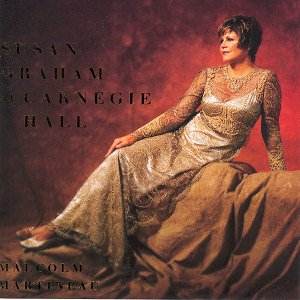Though we are assured that the song
recital is in its death agonies, Susan
Graham seems to pack the hall without
much difficulty, and here she is before
a cheering Carnegie Hall audience to
prove it. This is the more remarkable
when the programme makes no concessions
to the gallery, has no hackneyed titles
(not even among the four encores) thrown
in as crowd-pullers.
That Graham is a great
communicator is obvious from the final
item, specially written for her by Ben
Moore. It brought the house down and
is still pretty hilarious just listening
at home, and I wonít spoil the joke
by telling you all the things that happen
in it. You can appreciate the fact from
the Poulenc pieces, too, each of which
extracts a delighted ripple of amusement
from the audience, as well as the three
operetta items which conclude the "official"
programme. These were all contained
in her "French Operetta Arias"
disc (Erato 0927-42106-2) which I reviewed
a year or so ago, and all three are
here freer and more communicative. Apart
from these "fun" moments,
Graham produces thoroughly engaged performances
of the "harder" works by Debussy
and Berg. The performance of "De
grève" stands up pretty
well beside the historic Teyte/Cortot
recording, though that of "Fantoches"
does not Ė this is the sort of performance
which is only acceptable as an encore,
too fast and furious to make much sense
of the music.
This willingness to
throw caution to the winds and to dare
all is no doubt one of the ingredients
of Grahamís success, but I must say
that to my ears she goes over the top
in the Brahms. I began by appreciating
the urgency of her communication, but
as the cycle goes on the liberties get
greater and greater (with the pianist
apparently egging her on) and no. 5
in particular seemed to me a grotesque
distortion.
My other query is that
she uses a degree of vibrato which,
if not absolutely excessive, is enough
to blunt the focus of the sound. I already
noted this in the French Operetta disc,
but it has now increased, making the
earlier record seem reassuringly steady
in comparison. It still isnít enough
to be really annoying, but if the vibrato
has loosened this much in two years,
what will it be like in two yearsí time,
let alone twenty? I know that different
people react differently to this matter,
but compare her with the absolute steadiness
of Maggie Teyte in the Debussy or, to
make a more recent comparison, Katerina
Karnéus in the Mahler, and can
you really deny that this is preferable?
The recording is all
it should be and the trilingual booklet
has an excellent note by James M. Keller
as well as texts and translations.
Christopher Howell
